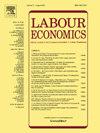The impacts of the gender imbalance on the marriage market: Evidence from World War II in Japan
IF 2.6
2区 经济学
Q2 ECONOMICS
引用次数: 0
Abstract
This study uses the unprecedented changes in the sex ratio due to the losses of men during World War II to identify the impacts of the gender imbalance on marriage market outcomes in Japan. Using newly digitized census-based historical statistics, we find evidence that men have a stronger bargaining position in the marriage market than women do. Under the conditions of relative male scarcity, women are less likely to marry. Although the entry of younger cohorts with a natural gender balance into the marriage market attenuated its magnitude, this tendency persisted until the mid-1950s. Widowed women facing male scarcity are particularly unable to remarry. Our results suggest that reinstating military pensions in the early 1950s further reduced their incentive to remarry.
性别失衡对婚姻市场的影响:来自二战日本的证据
本研究利用第二次世界大战期间由于男性的损失而导致的空前的性别比例变化来确定性别失衡对日本婚姻市场结果的影响。利用最新数字化的基于人口普查的历史统计数据,我们发现男性在婚姻市场上比女性拥有更强的议价地位。在男性相对稀缺的情况下,女性不太可能结婚。虽然具有自然性别平衡的年轻群体进入婚姻市场减少了其规模,但这种趋势一直持续到20世纪50年代中期。丧偶妇女面临着男性稀缺的问题,尤其无法再婚。我们的研究结果表明,在20世纪50年代初恢复军队养老金进一步降低了他们再婚的动机。
本文章由计算机程序翻译,如有差异,请以英文原文为准。
求助全文
约1分钟内获得全文
求助全文
来源期刊

Labour Economics
ECONOMICS-
CiteScore
3.60
自引率
8.30%
发文量
142
期刊介绍:
Labour Economics is devoted to publishing research in the field of labour economics both on the microeconomic and on the macroeconomic level, in a balanced mix of theory, empirical testing and policy applications. It gives due recognition to analysis and explanation of institutional arrangements of national labour markets and the impact of these institutions on labour market outcomes.
 求助内容:
求助内容: 应助结果提醒方式:
应助结果提醒方式:


